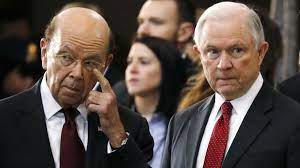Campaign Legal Center v. DOJ — FOIA Postscript to Department of Commerce v. New York (Part I)
Can an agency properly invoke the deliberative process privilege to shield internal deliberations over a sham memo requesting that another agency take action, knowing that the recipient agency will use the request to hide the real reason for its contemplated action? Earlier this year, the D.C. Circuit answered in the affirmative. Campaign Legal Center v. DOJ, 34 F.4th 14 (D.C. Cir. 2022). The case might be described as the Freedom of Information Act (“FOIA”) addendum to Department of Commerce v. New York, —U.S. —, 139 S. Ct. 2551 (2019). This series of posts discusses the rarely referenced “government misconduct” exception to the deliberative process privilege and its applicability to the communications sought in Campaign Legal Center v. DOJ.
Department of Commerce v. New York: Pretextual Justifications for Agency Action
Department of Commerce v. New York has already attained canonical status. The case involved an effort to include a citizenship question on the “short form” 2020 decennial census.
By the time Donald Trump assumed the presidency and appointed Wilbur Ross as his Secretary of Commerce, the Census Bureau’s planning for the 2020 decennial census was well underway. Secretary Ross insisted upon adding the citizenship question, despite Census Bureau officials’ opposition. Those officials expressed their long standing concern that such a question “discourage[s] noncitizens from responding to the census and leads to a less accurate count of the total population.” 139 S.Ct. at 2562.[1]

So Secretary Ross “contrived” with Attorney General Jefferson B. Sessions — the Department of Justice (“DOJ”) would request addition of the citizenship question, citing a desire to enhance the Department’s Voting Rights Act enforcement. Id. at 2575. John Gore, the head of the Civil Rights Division, was tasked with drafting the letter, for signature by and Arthur Gary, General Counsel of the Justice Management Division. Campaign Legal Center, supra, 34 F.4th at 20.[2] Shortly after receiving the letter, Secretary Ross announced his decision to include the citizenship question, asserting that he was acting pursuant to DOJ’s request. Department of Commerce, supra, 139 S. Ct. at 2562. As the Supreme Court would ultimately remark, “[i]n the Secretary’s telling, Commerce was simply acting on a routine data request from another agency.” Id. at 2575. The State of New York and several other plaintiffs challenged the action as “arbitrary and capricious,” among other things, asserting that Secretary Ross’ stated reasons for his actions were pretextual.
In remanding the case to the district court, the Supreme Court explained:
The reasoned explanation requirement of administrative law . . . is meant to ensure that agencies offer genuine justifications for important decisions, reasons that can be scrutinized by courts and the interested public. Accepting contrived reasons would defeat the purpose of the enterprise. If judicial review is to be more than an empty ritual, it must demand something better than the explanation offered for the action taken in this case.
Id. at 2575-75.
This forceful expression of a critically important principle makes Department of Commerce a seminal case. See generally, Bernard W. Bell, Legislative History Without Legislative Intent: The Public Justification Approach to Statutory Interpretation, 60 OHIO ST. L.J. 1, 9-20 (1999).[3]
Campaign Legal Center v. DOJ: FOIA Addendum to Department of Commerce v. New York
Shortly after DOJ’s request for inclusion of the citizenship question became public, the Campaign Legal Center (“CLC”) sought from DOJ, pursuant to FOIA, documents “that would explain how and why [DOJ] came to” make such a request. DOJ withheld over 100 pages of responsive documents, invoking at least two FOIA exemptions. Campaign Legal Center, supra, 34 F.4th at 18.
The D.C. Circuit, in rendering its opinion resolving the case, described in somewhat more detail the internal processes within DOJ that resulted in the production of the request letter. John Gore had completed a first draft of DOJ’s request letter and initiated consultations with other DOJ officials approximately one month before the request letter was ultimately sent. First, he had circulated a draft for comments within the Civil Rights Division, receiving reponses from a political appointee in his office and the Chief of the Voting Section. Then, for several weeks, Gore and Arthur Gary, the letter’s intended signatory, discussed the letter and exchanged drafts. In late November, Gore sent a draft to Justice Department leadership. Over the following two weeks, Rachael Tucker of the Office of the Attorney General and Robert Troester of the Office of the Deputy Attorney General reviewed and commented on the draft. Two other advisors to the Attorney General also participated in the drafting process. All of these communications would be responsive to the FOIA request CLC ultimately made.
In response to CLC’s request for document, DOJ asserted the deliberative process privilege incorporated in FOIA exemption 5.[4] CLC argued that the privilege did not apply because the Attorney General had already decided that DOJ would request inclusion of an addition of the citizenship question even before asking Gore to draft the request letter. Campaign Legal Center v. DOJ, supra, 34 F.4th 14. Thus, DOJ could not show that the consultations over the letter were “predecisional,” one of two critical requirements that must be satisfied to invoke the deliberative process privilege.[5]

The D.C. Circuit held that the communications were covered, concluding that the communications were predecisional. The Court explained: “[E]ven after an agency head has set the direction of agency policy at the macro level, the subsequent work needed to define, refine, debate, and flesh out the boundaries of and justifications for that position can, upon a proper showing, also qualify as predecisional.” Id. at 24.
The Court quite charitably described the task at hand during the drafting and refining of the Gary Letter. In deliberating over the letter’s details, Justice Department officials were “engaged in formulating and refining both the actual content of and the public rationale for a new and consequential governmental policy in a way that required balancing the proposed justifications for a citizenship question with other departmental policy and litigation interests.” Id. at 24. Less charitably characterized, the officials were attempting to come up with reasons to justify a request that the Attorney General wanted, to provide “cover” for another cabinet secretary, Department of Commerce, supra, 139 S. Ct. 2575, but do so in a way that did the least damage to DOJ’s policies and overall reputation.
The Campaign Legal Center also argued that deliberations over a pretextual request fell outside the scope of the deliberative process privilege. The Court curtly dismissed the argument. It noted that CLC had neither cited a FOIA case recognizing such an exception, nor “advanced a developed argument” for defeating the deliberative process privilege on that basis. Campaign Legal Center, supra, 34 F.4th at 26. The Court’s analysis on the last point is somewhat superficial. In the second and third posts in this series I will turn to the question the D.C. Circuit resolved so precipitously.
[1] I discussed two potential motives for the Secretary’s push to add the citizenship question: (1) a desire for partisan political gain, by enhancing the representation of “red” states and Republican-leaning communities, and (2) a desire to diminish the representation of “Latino, Asian-American, Arab-American communities, as well as immigrant communities of color generally.” Citizenship and the Census: State of New York v. U.S. Department of Commerce (Round One)(Part IV)(August 22, 2018). In that post I sought to assess the legal implications of making the citizenship question decision based on such motivations.
[2] The Department of Commerce had helpfully arranged for an outside advisor to provide a draft of the letter for DOJ. Campaign Legal Center, supra, 34 F.4th at 20, 25.
[3] In Legislative History Without Legislative Intent, I argue that the government has a duty to explain the directives it issues, grounding the obligation in the relationship between citizens and the government and the respect due those affected by the government directive. I primarily focus on the obligation of legislative bodies to explain statutes, not merely enact them, and its implications for statutory interpretations, namely the legitimacy of referencing legislature’s “public justifications” of the statutes they enact. Such “public justifications often encompass portions of the statute’s legislative history.
[4] Id. at 21. The Department also invoked the privacy exemption, exemption 6, with regard to some documents. Id. at 21 & n.3.
[5] The other critical requirement is that the communications the agency seeks to withhold be “deliberative.”



